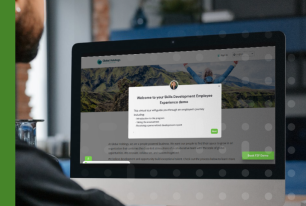How Will Your Organization Be Remembered after the Current Crisis?
For the good of your people and business – your actions now will impact the future success of you, your people, and your company.
Share
In a historic stretch of time, global unemployment rates were at the lowest they have ever been. Then, COVID-19 hit and they skyrocketed – seemingly overnight. Who could have predicted this stark new reality? As organizations grapple with the task of managing lay-offs and mass redundancies in some of the hardest-hit sectors like air travel and hospitality, how should we support those remaining in and exiting our organizations?
In March, I attended what was probably one of the last HR conferences before the lockdown, aptly titled ‘The Rise of Humanity in the workplace’. For me, the key message was that as leaders and managers, we need to adapt, transform, and lead with more humanity and empathy to enable our people to thrive.
Thriving people (those prospering in terms of their health, wealth, and career prospects) are twice as likely to be found in organizations that effectively balance people and business concerns in decision making. Numerous studies show them to be more successful in areas such as health, relationships, and work performance.
In recent weeks, several organizations have contacted me seeking advice and support in helping those at risk (with potential opportunities for redeployment), and those being made redundant. With uncertainty and anxiety common, there is a prevailing realization that although not a statutory obligation, organizations have a ‘human’ responsibility to help their people navigate these difficult times.
Leaders and organizations’ reputations will be defined for decades by the way in which they have managed their people, customers, and stakeholders, throughout this crisis.
Leaders and organizations’ reputations will be defined for decades by the way in which they have managed their people, customers, and stakeholders, throughout this crisis.
I truly believe that acting now is not just good for people but also for businesses in the longer term. Some level of practical and emotional help for employees is important and should be the aim of all organizations. Here are some ideas I have discussed with clients:
#1—Upskilling, Reskilling, and Redeployment
One of the biggest opportunities and challenges of this decade is up-skilling and re-skilling. Many leaders are reviewing their business models, strategy, and what is needed for success. How will this impact jobs in the coming months and longer-term?
At the same time, many employees are wondering whether they have a job to come back to.
Look for the opportunities for how you can maintain the knowledge and experience you have, rather than be in a position that you need to go to hire externally at a future date. Be transparent about what type of redeployment opportunities may be available to employees; use objective assessment to understand individual and group strengths and development areas as well as future potential capabilities. Armed with this information, everyone understands the reskilling pathways and critical experiences that people will need to get to move from A to B. This facilitates transformation and more agile movement across the organzsation or indeed the knowledge that exiting is the best strategy to pursue a career elsewhere.
Point people in the direction of any internal or external learning and development resources that may be available to them to address specific skills gaps. Identify if there are any other opportunities to provide training on core skills such as coaching for managers which would be useful for many people remaining in or indeed exiting the organization.
Giving people a direction, a sense of control and a purpose to work towards will enable them more successfully to emerge in a stronger position in the future, no matter what their current situation is.
Giving people a direction, a sense of control and a purpose to work towards will enable them to emerge in a stronger position in the future.
#2—Provide Practical Job-Hunting Support
In my experience, one of the most helpful ways that you can support people at risk /are competing for redeployment opportunities /are being made redundant is through providing practical support to enable them to secure a new position.
There are many outplacement and talent management service providers that offer such services such as support with cv writing, interview skills, mock interviews and assessments with development advice, job search techniques, use of social media tools, etc. on an individual and group basis.
You may be able to provide this type of support internally and /or can direct them to resources to support such as free public resources and job search services. Do not underestimate the value of providing direction, advice, and/or assistance in this area, particularly for long term employees who may not have created a CV or completed an interview for over 20 years!
#3—Financial Planning and Assistance
How am I going to afford X, Y, Z? It is the first thing that comes to mind for most of us when informed of a pay cut, reduced hours, or risk of lay off or redundancy. Practical help matters more than anything now. In a recent report by Mercer an average of 71% of people responded that long term financial planning, financial wellness education and a midlife check-up for health, wealth and career were most important to their futures*
At a minimum, provide clear information about the reasons for the lay off’s/redundancies, changes to pay/amount of redundancy pay, and how it affects pensions and state benefits. Consider the feasibility of offering a session with a qualified financial advisor, particularly to those who have been identified as most at risk of job loss/significant wage reductions. What free resources can you point them in the direction of? Access to counseling services as part of your Employee Assistance Program (EAP) could, for example, provide support through enabling employees to discuss the emotional as well as practical implications of the situation.
I firmly believe that organizations, their leaders, and people that show empathy, take care of, and support their employees for the long haul are those that will continue to grow and prosper, as we exit lockdowns and begin to return to work.
As humans, we are programmed to remember negative emotional experiences over positive ones. The experiences we have had during this time, including with our current employers will remain in our conscience for a long time to come. As leaders and managers, we need to shift our thinking from short term losses to longer-term gains. We must work to ensure there are support structures in place to enable people to thrive; both those remaining and exiting our organizations…. for now….
Contact us to learn more about how we can help you to understand your people’s capabilities now and for the future, as well as support those remaining in role, being redeployed or made redundant.
*Ref: Mercer paper – ‘Win with Empathy’ – Global Talent Trends 2020.









